|
|
|
Sort Order |
|
|
|
Items / Page
|
|
|
|
|
|
|
| Srl | Item |
| 1 |
ID:
147487
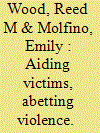

|
|
|
|
|
| Summary/Abstract |
Annual allocations of bilateral and multilateral humanitarian assistance to conflict-affected states total billions of dollars each year. Humanitarian assistance plays a vital role in sustaining vulnerable populations. However, inflows of such aid may also exacerbate violence by both threatening insurgents and creating incentives for these groups to extend or deepen control over the areas in which aid is concentrated. Insurgent efforts to ameliorate threats and co-opt resources ultimately raise the risk of conflict between insurgent and counterinsurgent forces. We use recently constructed geo-located data on both aid commitments and conflict events in a sample of twenty sub-Saharan African countries during the post–Cold War era to evaluate the impact of aid on violence. Even after accounting for the non-random assignment of aid within conflict zones, we find that humanitarian aid increases the frequency of subsequent violent engagements between rebel and government forces in the areas in which aid is concentrated. Importantly, however, we find no evidence that other forms of foreign development aid exacerbate or prolong violence in the areas in which they are allocated.
|
|
|
|
|
|
|
|
|
|
|
|
|
|
|
|
| 2 |
ID:
117591
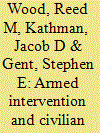

|
|
|
|
|
| Publication |
2012.
|
| Summary/Abstract |
Research has begun to examine the relationship between changes in the conflict environment and levels of civilian victimization. We extend this work by examining the effect of external armed intervention on the decisions of governments and insurgent organizations to victimize civilians during civil wars. We theorize that changes in the balance of power in an intrastate conflict influence combatant strategies of violence. As a conflict actor weakens relative to its adversary, it employs increasingly violent tactics toward the civilian population as a means of reshaping the strategic landscape to its benefit. The reason for this is twofold. First, declining capabilities increase resource needs at the moment that extractive capacity is in decline. Second, declining capabilities inhibit control and policing, making less violent means of defection deterrence more difficult. As both resource extraction difficulties and internal threats increase, actors' incentives for violence against the population increase. To the extent that biased military interventions shift the balance of power between conflict actors, we argue that they alter actor incentives to victimize civilians. Specifically, intervention should reduce the level of violence employed by the supported faction and increase the level employed by the opposed faction. We test these arguments using data on civilian casualties and armed intervention in intrastate conflicts from 1989 to 2005. Our results support our expectations, suggesting that interventions shift the power balance and affect the levels of violence employed by combatants.
|
|
|
|
|
|
|
|
|
|
|
|
|
|
|
|
| 3 |
ID:
133276


|
|
|
|
|
| Publication |
2014.
|
| Summary/Abstract |
Although some rebel groups work hard to foster collaborative ties with civilians, others engage in egregious abuses and war crimes. We argue that foreign state funding for rebel organizations greatly reduces incentives to "win the hearts and minds" of civilians because it diminishes the need to collect resources from the population. However, unlike other lucrative resources, foreign funding of rebel groups must be understood in principal-agent terms. Some external principals-namely, democracies and states with strong human rights lobbies-are more concerned with atrocities in the conflict zone than others. Multiple state principals also lead to abuse because no single state can effectively restrain the organization. We test these conjectures with new data on foreign support for rebel groups and data on one-sided violence against civilians. Most notably, we find strong evidence that principal characteristics help influence agent actions.
|
|
|
|
|
|
|
|
|
|
|
|
|
|
|
|
| 4 |
ID:
175334
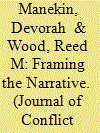

|
|
|
|
|
| Summary/Abstract |
Female combatants play a central role in rebel efforts to cultivate and disseminate positive narratives regarding the movement and its political goals. Yet, the effectiveness of such strategies in shaping audience attitudes or generating tangible benefits for the group remains unclear. We propose and test a theory regarding the channels through which female fighters advance rebel goals. We argue that female fighters positively influence audience attitudes toward rebel groups by strengthening observers’ beliefs about their legitimacy and their decision to use armed tactics. We further contend that these effects directly help them secure support from transnational nonstate actors and indirectly promote state support. We assess our arguments by combining a novel survey experiment in two countries with analyses of new cross-national data on female combatants and information about transnational support for rebels. The empirical results support our arguments and demonstrate the impact of gender framing on rebel efforts to secure support.
|
|
|
|
|
|
|
|
|
|
|
|
|
|
|
|
| 5 |
ID:
134983
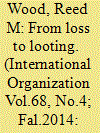

|
|
|
|
|
| Summary/Abstract |
Research into the causes of civilian abuse during civil conflict has increased significantly in recent years, yet the mechanisms responsible for changes in actors' tactics remain poorly understood. I investigate how the outcomes of discrete conflict interactions influence subsequent patterns of rebel violence against civilians. Two competing logics suggest opposite influences of material loss on violence. A stylized model of rebel-civilian bargaining illustrates how acute resource demands resulting from recent severe conflict losses may incentivize insurgent violence and predation. I also identify several factors that might condition this relationship. I evaluate hypotheses based on these expectations by first analyzing the behaviors of the Lord's Resistance Army using subnational conflict data and then analyzing a cross-sectional sample of post–Cold War African insurgencies. Results from both the micro- and macrolevel analyses suggest that rising battlefield costs incentivize attacks on civilians in the period immediately following the accrual of losses. However, group-level factors such as effective control over territory and the sources of rebel financing condition this relationship. The findings suggest potential benefits from examining the interaction of strategic conditions and more static organizational characteristics in explaining temporal and geographic variation in rebel violence.
|
|
|
|
|
|
|
|
|
|
|
|
|
|
|
|
| 6 |
ID:
083534
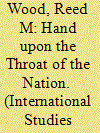

|
|
|
|
|
| Publication |
2008.
|
| Summary/Abstract |
While intended as a nonviolent foreign policy alternative to military intervention, sanctions have often worsened humanitarian and human rights conditions in the target country. This article examines the relationship between economic sanctions and state-sponsored repression of human rights. Drawing on both the public choice and institutional constraints literature, I argue that the imposition of economic sanctions negatively impacts human rights conditions in the target state by encouraging incumbents to increase repression. Specifically, sanctions threaten the stability of target incumbents, leading them to augment their level of repression in an effort to stabilize the regime, protect core supporters, minimize the threat posed by potential challengers, and suppress popular dissent. The empirical results support this theory. These findings provide further evidence that sanctions impose political, social, and physical hardship on civilian populations. They also underscore a need for improvements in current strategies and mechanisms by which states pursue foreign-policy goals and the international community enforces international law and stability.
|
|
|
|
|
|
|
|
|
|
|
|
|
|
|
|
| 7 |
ID:
107968
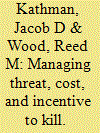

|
|
|
|
|
| Publication |
2011.
|
| Summary/Abstract |
How do third-party interventions affect the severity of mass killings? The authors theorize that episodes of mass killing are the consequence of two factors: (1) the threat perceptions of the perpetrators and (2) the cost of implementing genocidal policies relative to other alternatives. To reduce genocidal hostilities, interveners must address these factors. Doing so requires that interveners alter the genocidaire's expectation of a successful extermination policy, which in turn requires a demonstration of the third party's resolve. This cannot be achieved immediately upon intervention, and, given the perpetrator's strategic response to third-party involvement, the authors expect intervention to increase hostilities in the short term. With time, however, the authors contend that the characteristics of impartial interventions offer the greatest opportunity for reducing the violence in the long term. A statistical analysis of the 1955-2005 period supports the theoretical expectations.
|
|
|
|
|
|
|
|
|
|
|
|
|
|
|
|
| 8 |
ID:
100396
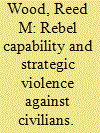

|
|
|
|
|
| Publication |
2010.
|
| Summary/Abstract |
This article explores the strategic motivations for insurgent violence against civilians. It argues that violence is a function of insurgent capacity and views violence and security as selective benefits that insurgents manipulate to encourage support. Weak insurgent groups facing collective action problems have an incentive to target civilians because they lack the capacity to provide sufficient benefits to entice loyalty. By contrast, stronger rebels can more easily offer a mix of selective incentives and selective repression to compel support. This relationship is conditioned by the counterinsurgency strategies employed by the government. Indiscriminate regime violence can effectively reduce the level of selective incentives necessary for insurgents to recruit support, thus reducing their reliance on violence as a mobilization tool. However, this relationship only holds when rebels are sufficiently capable of credibly providing security and other incentives to civilian supporters. These hypotheses are tested using data on one-sided violence from the Uppsala Conflict Data Program. The statistical analysis supports the hypothesis that comparatively capable insurgents kill fewer civilians than their weaker counterparts. The results also suggest a complex interaction between insurgent capability and government strategies in shaping insurgent violence. While weaker insurgents sharply escalate violence in the face of indiscriminate regime counterinsurgency tactics, stronger groups employ comparatively less violence against civilians as regime violence escalates.
|
|
|
|
|
|
|
|
|
|
|
|
|
|
|
|
| 9 |
ID:
117519
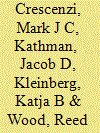

|
|
|
|
|
| Publication |
2012.
|
| Summary/Abstract |
In this paper, we examine how the past alliance behavior of nations affects the likelihood that these states will be involved in alliance formation. We contend that nations evaluate the reputations of potential allies when searching for alliance partners. Reputation information is processed by governments along with other immediate concerns. By introducing a model and developing subsequent measures of reputational alliance histories, we improve upon our current understanding of the factors that drive alliance formation. Using alliance reputation data derived from the ATOP project (1816-2000), we find support for the hypothesis that a reputation for upholding one's agreements significantly improves the likelihood of membership in future alliances.
|
|
|
|
|
|
|
|
|
|
|
|
|
|
|
|
| 10 |
ID:
149476
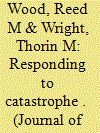

|
|
|
|
|
| Summary/Abstract |
Natural disasters often cause significant human suffering. They may also provide incentives for states to escalate repression against their citizens. We argue that state authorities escalate repression in the wake of natural disasters because the combination of increased grievances and declining state control produced by disasters creates windows of opportunity for dissident mobilization and challenges to state authority. We also investigate the impact of the post-disaster humanitarian aid on this relationship. Specifically, we argue that inflows of aid in the immediate aftermath of disasters are likely to dampen the impact of disasters on repression. However, we expect that this effect is greater when aid flows to more democratic states. We examine these interrelated hypotheses using cross-national data on immediate-onset natural disasters and state violations of physical integrity rights between 1977 and 2009 as well as newly collected foreign aid data disaggregated by sector. The results provide support for both our general argument and the corollary hypotheses.
|
|
|
|
|
|
|
|
|
|
|
|
|
|
|
|
| 11 |
ID:
145101
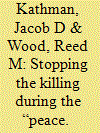

|
|
|
|
|
| Summary/Abstract |
Recent research has investigated the relative effectiveness of peacekeeping in stabilizing postconflict states, preventing the return to armed hostilities between belligerents, and reducing civilian abuse during civil conflict. This research has shed light on important theoretical and policy-relevant issues. However, scholars have largely neglected to evaluate the role of peacekeeping in protecting civilians during the notoriously unstable postconflict period. Even after active conflict has ended, the factions often persist in abusing civilians to reinforce conflict gains, shape the postconflict environment, exact revenge for wartime grievances, or spoil peace processes. This analysis investigates the effectiveness of peacekeeping missions in protecting civilians during the post-conflict “peace.” Using newly collected data on the number and type of United Nations peacekeeping personnel commitments along with civilian victimization data for all African conflicts between 1992 and 2010, we find that greater numbers of peacekeeping troops reduce anticivilian violence. By contrast, larger deployments of UN observers are positively correlated with violence.
|
|
|
|
|
|
|
|
|
|
|
|
|
|
|
|
| 12 |
ID:
151114
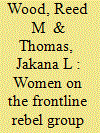

|
|
|
|
|
| Summary/Abstract |
Despite the frequent participation of women in armed groups, few studies have sought to explain the variation in their roles across different rebellions. Herein, we investigate this variation. We argue that the political ideology a group adopts plays a central role in determining the extent of women’s participation, particularly their deployment in combat roles. Specifically, we link variations in women’s roles in armed groups to differences in beliefs about gender hierarchies and gender-based divisions of labor inherent in the specific ideologies the groups adopt. We evaluate hypotheses drawn from these arguments using a novel cross-sectional dataset on female combatants in a global sample of rebel organizations active between 1979 and 2009. We find that the presence of a Marxist-oriented ‘leftist’ ideology increases the prevalence of female fighters while Islamist ideologies exert the opposite effect. However, we find little evidence that nationalism exerts an independent influence on women’s combat roles. We also note a general inverse relationship between group religiosity and the prevalence of female fighters. Our analysis demonstrates that political ideology plays a central role in determining whether and to what extent resistance movements incorporate female fighters into their armed wings.
|
|
|
|
|
|
|
|
|
|
|
|
|
|
|
|
|
|
|
|
|